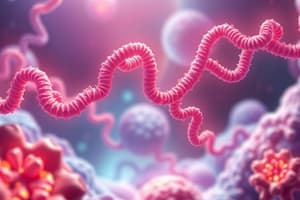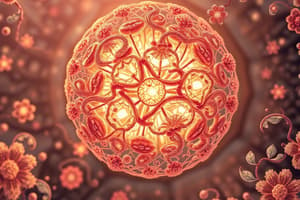Podcast
Questions and Answers
What is the first step of protein synthesis?
What is the first step of protein synthesis?
- Replication
- Transcription (correct)
- Translation
- Modification
Where does protein synthesis primarily occur within the cell?
Where does protein synthesis primarily occur within the cell?
- Nucleus
- Mitochondria
- Cytoplasm (correct)
- Endoplasmic reticulum
What role does RNA polymerase play in protein synthesis?
What role does RNA polymerase play in protein synthesis?
- Connecting amino acids
- Copying DNA sequence
- Creating mRNA (correct)
- Translating mRNA to protein
Which molecules are involved in the translation step of protein synthesis?
Which molecules are involved in the translation step of protein synthesis?
What is a key reason for keeping DNA in the nucleus during protein synthesis?
What is a key reason for keeping DNA in the nucleus during protein synthesis?
What type of bonds link amino acids together in a protein?
What type of bonds link amino acids together in a protein?
Which stage is responsible for moving the genetic code from DNA to mRNA?
Which stage is responsible for moving the genetic code from DNA to mRNA?
Why is protein synthesis critical for all living organisms?
Why is protein synthesis critical for all living organisms?
What role does tRNA play in the process of protein synthesis?
What role does tRNA play in the process of protein synthesis?
Which protein is specifically mentioned as regulating muscle cell growth?
Which protein is specifically mentioned as regulating muscle cell growth?
How do proteins synthesized in plants contribute to photosynthesis?
How do proteins synthesized in plants contribute to photosynthesis?
What function does the protein p53 serve in animals?
What function does the protein p53 serve in animals?
What is the significance of the Plasmin-sensitive protein (Pls) in bacteria?
What is the significance of the Plasmin-sensitive protein (Pls) in bacteria?
Which statement about protein synthesis in animals is true?
Which statement about protein synthesis in animals is true?
What is the ultimate product of the process of translation in protein synthesis?
What is the ultimate product of the process of translation in protein synthesis?
Flashcards
Protein Synthesis
Protein Synthesis
The process of creating proteins in living organisms.
Transcription
Transcription
The process of copying a DNA sequence into an mRNA molecule.
Translation
Translation
The process of using mRNA to build a protein.
mRNA
mRNA
Signup and view all the flashcards
Ribosome
Ribosome
Signup and view all the flashcards
Protein Function
Protein Function
Signup and view all the flashcards
Protein Location
Protein Location
Signup and view all the flashcards
DNA
DNA
Signup and view all the flashcards
What is the role of mRNA in protein synthesis?
What is the role of mRNA in protein synthesis?
Signup and view all the flashcards
What is the purpose of tRNA in protein synthesis?
What is the purpose of tRNA in protein synthesis?
Signup and view all the flashcards
What is the function of a ribosome in protein synthesis?
What is the function of a ribosome in protein synthesis?
Signup and view all the flashcards
What is a polypeptide chain?
What is a polypeptide chain?
Signup and view all the flashcards
How do enzymes function in protein synthesis?
How do enzymes function in protein synthesis?
Signup and view all the flashcards
What is the role of myostatin in animals?
What is the role of myostatin in animals?
Signup and view all the flashcards
What is the function of RuBisCo in plants?
What is the function of RuBisCo in plants?
Signup and view all the flashcards
Study Notes
Protein Synthesis Overview
- Protein synthesis is the process of creating proteins, crucial for various bodily functions.
- It involves copying genetic code from DNA to mRNA, then using a ribosome to translate this information into a protein chain.
Protein Synthesis Purpose
- Creates a diverse range of proteins vital for cell structure and function.
- Proteins perform various roles, including functions like cell division in animals, sugar production in plants, and antibiotic resistance in bacteria.
Protein Synthesis Location
- Occurs in the cytoplasm at the ribosome.
- Ribosomes are made of rRNA and work with mRNA and tRNA to synthesize proteins from amino acids.
- DNA, the source of genetic instructions, is stored in the nucleus.
- Transcription, the process of copying the DNA code to mRNA, occurs in the nucleus, allowing the code to move from the nucleus to the ribosome.
Protein Synthesis Process
- Transcription: mRNA is created in the nucleus by RNA polymerase, copying a DNA sequence.
- Translation: mRNA travels to the ribosome, where tRNA brings the corresponding amino acids. Amino acids are linked via peptide bonds, forming a polypeptide chain. This process continues until a stop codon is reached.
Protein Synthesis in Different Organisms
- Animals: Proteins perform diverse functions, including enzyme production (e.g., lactase for lactose digestion), growth regulation (e.g., myostatin for muscle regulation), and cell cycle control (e.g., p53, Rb).
- Plants: Protein RuBisCo is vital for carbon dioxide fixation during photosynthesis.
- Bacteria: Some proteins, like Pls, confer antibiotic resistance.
Key Molecules in Protein Synthesis
- mRNA: Carries the genetic code from DNA to ribosomes.
- tRNA: Brings amino acids to the ribosome based on mRNA codons.
- rRNA: Forms the ribosome structure, the site of protein synthesis.
- DNA: The original genetic code stored in the nucleus.
- RNA Polymerase: Enzyme that creates mRNA.
Studying That Suits You
Use AI to generate personalized quizzes and flashcards to suit your learning preferences.
Description
This quiz covers the essential aspects of protein synthesis, including its purpose, location, and the processes involved. Understand how genetic information is transcribed from DNA to mRNA and translated into proteins by ribosomes. Explore the vital roles proteins play in various biological functions.




